- Home
- Donald Hamilton
The Threateners Page 15
The Threateners Read online
Page 15
“Are the accommodations to your satisfaction, senhor? Can I bring you anything, some ice perhaps?”
He was in just about the same black-and-white waiter get-up I’d seen him wearing last. I wondered how he’d managed the transition to this hotel, but money is very effective down there, as elsewhere; and his position wasn’t necessarily official. No guests and very few employees are likely to challenge a man who marches through a sizable hostelry dressed pretty much like the rest of the staff and acts as if he knows where he’s going and what he’s going to do when he gets there.
“Ice, that’s gelo in Portuguese, isn’t it?” They like us to maintain the ID nonsense even after it’s become unnecessary and ridiculous. “Yes, we could use some ice, thanks. The bucket’s in the bathroom.”
He glanced at the connecting door and lowered his voice: “I have been instructed to inform you that ar preliminary check has been run on the credentials of all members of your tour; they seem to be what they claim. The computer diskette you sent could not be read by our people; it has been passed along to the proper technical section for analysis.”
So my fellow travelers were all genuine, at least as far as a preliminary check was concerned, which didn’t necessarily mean they were harmless. And Ruth’s computer had apparently managed to cook up a reasonably impenetrable code.
“What about the pix?” I asked Armando.
“Excuse me?”
Apparently his English wasn’t quite up to my photo slang. I said, “Pix. Pictures. Photographs. The color negatives I sent in. Have they got around to developing and printing them yet?”
He said, “Pix. I will have to remember that. Yes, the pix have been processed; and the results seem to be quite interesting.”
“Don’t keep me in suspense.”
“There were one hundred and forty negatives on the four rolls submitted. Among those images, I am informed, two faces reoccur with statistically significant frequency, one male, one female. That is, of course, excluding the members of your group.”
I studied the prints he gave me and said, “Yes, those two have been doing a pretty conspicuous job of surveillance. I saw the big blond guy for the first time having lunch with the girl yesterday, and I saw him again up on Sugarloaf today. The dame has been following me around for over a month. She had three helpers back in Santa Fe, but I haven’t seen any of them since we left the States. Maybe she left them behind and, when she got down here, picked up Blondie as a substitute.”
Armando said, “We have no information on the man as yet. We do have an identification of the woman.”
“Great, who is she?”
“Apparently she has no record as a criminal or as an international agent of any kind; no matching photograph was found in any files we would normally access. I am informed that her identity probably would have remained a mystery if one of our female colleagues hadn’t come into a certain office on another errand, and noticed the prints on the desk, and asked what in the world we were doing with photographs of Pat Weatherford. Apparently our lady agent was a tennis aficionado, the kind that can tell you precisely who won Wimbledon in what year, against whom, and with what score. Patricia Weatherford seems to be a typical wealthy young Yankee woman, riding horses, sailing boats, and flying airplanes. However, her afición is tennis. She is a player of professional caliber. She made a brilliant debut as a young girl, and great things were expected of her, but apparently she never quite lived up to her early promise. Our agent who identified her expressed the opinion that Miss Weatherford could have become a truly top-ranking player if she had been a little hungrier and worked a little harder; but prize money, of course, meant nothing to her, not with the Weatherford fortune behind her."
I said, “My God! Those Weatherfords?”
What I knew about the Weatherfords was what everybody knew: their wealth was old railroad money multiplied a good many times by modem manipulation. A while back I spent a little time in Newport, Rhode Island. One of the local landmarks was the magnificent old Weatherford summer mansion, still in family hands. I wondered what the hell a Weatherford scion—well, scioness—was up to, following me around two continents.
“Anything else?” I asked.
"It may or may not be significant, but another reason Miss Weatherford never quite made it to the top in tennis seems to be that instead of dedicating herself wholly to her sport she spends much of her time, as well as her money, crusading for various causes. Ban the bomb. Equalize the women. Preserve the jungle. Protect the animals. Purify the water. Save the ozone.” Armando shrugged. “She seems to be a member of a great many organizations, none particularly dangerous as far as can be determined. Some are feminist groups like NOW, of course, but she also belongs to ASPCA, MPS, Greenpeace ... the list covers most of a typewritten page, and I did not memorize it all. Here’s a dossier on the girl, complete with her worthy affiliations. No unworthy ones seem to be recorded.”
"No mention of Vasquez, eh?" I glanced at the paper he’d given me. “What’s MPS? It sounds like a disease. Massive Paranoia Syndrome?”
“Along with several others, it has not yet been identified; they are working on it.” He raised his voice. “I will bring your ice, senhor.”
After he’d left for good, I opened the ice bucket he’d taken away and then returned to me, and found the gun I’d asked for. It was a smallish automatic pistol, a fairly beat-up Browning equivalent of the .380 Llama I’d once taken from Ruth. Well, I’d said any clunker would do. While I was keeping my target firmly in mind, I wasn’t expecting to find him within pistol range very soon. I either had to learn where he was and go there, or get him to come to me, somehow. In the meantime I just wanted to demonstrate that I took my bodyguarding seriously. The gun’s magazine held thirteen cartridges. As I finished checking out the weapon Ruth knocked on the connecting door and came in. She paused briefly, seeing the pistol; then she came to stand in front of me.
"Are we expecting trouble?"
“If we weren’t, you’d be taking this tour alone, wouldn’t you?”
I eased the magazine into the butt, slapped it home, and tucked the weapon away inside my shirt. Ruth was still standing before me. Something in her attitude caught my attention at last. One of her hands was held behind her; and she looked like a little girl bringing Daddy a secret present she wasn’t quite sure he'd like.
“Matt,” she said, bringing the hand into sight. It held another pair of cute little three-and-a-half-inch computer diskettes. “For your collection. And Washington’s.”
I maintained a poker face as I examined the two disks. It seemed inadvisable to show annoyance merely because the perverse lady who’d been put into my charge liked to play tricks on her stupid bodyguard. I read the hand-printing on the visible label: MS-X2 (Ch. 27-34). Eight more chapters accounted for.
I spoke carefully: “I thought you said your next contact would be made in Buenos Aires. . . . Oh, hell, don’t look so guilty. Sit down. Be comfortable. Have a drink.” After supplying our liquid needs and seating myself, I raised my glass to her. “Sneaky, aren’t you?”
“Matt, I—”
“Let me guess,” I said. “I kind of twisted your arm and got you to tell me that the next rendezvous was to be in Buenos Aires. You got scared that I’d watch you too closely when we got there and learn more than you wanted me to, or call in some help and set a trap of some kind, so you got in touch with the gal in B. A. and told her to hop a plane and rendezvous with you where I wouldn’t be expecting a meeting.”
She glanced at me sharply. “How do you know it was a woman?"
I said, “Nothing was delivered to you here in the hotel.
Our rooms were checked by friendlies right after the keys were issued; that’s why you and I stalled around sampling that lousy local sugarcane tipple they were handing out free in the lobby. So nobody could have left anything for you here, they’d have spotted it, and you’ve had no visitors. The rest room at the Itaipu power plant is the only other place I
haven’t been as close to you as a Band-Aid since we left Rio. And you didn’t go into the masculino. Ergo, your contact was feminine. Logic.” I looked at her for a moment. “You’ve got three more contacts ahead, Ruth. They’ll come a lot more easily, and safely, if you take a deep breath and decide to trust me.”
I always feel silly and naive talking about trust these cynical days, but you’ve got to at least give it a chance occasionally, or you’ll never find it when you need it.
Ruth drew a long breath. “There are . . . things you don’t know, Matt. I wish . . .” She stopped. After a little, she said, changing the subject deliberately, “I saw that woman in the lobby. The one with freckles you call Spooky Three. I wonder what her real name is. ”
I asked, “Do you ever watch tennis on TV?”
She frowned, puzzled by the apparently irrelevant question. “Tennis? I’m not much for watching TV sports unless I’m very bored or sick in bed. What about tennis?”
“I’ve just been informed that the gal’s name is Patricia Weatherford. She’s a fairly well known tennis pro; she’s also a very wealthy girl. ’’
Ruth looked startled. “Oh, those Weatherfords.”
“Right. She also seems to be mixed up with a lot of do-good organizations, some Lib-type, but mostly of an ecological bent. I can’t see the significance of that at the moment, but there may be some. Here.” I passed her the paper Armando had left me. “Do these outfits mean anything to you? NOW and Greenpeace, all right, everybody’s heard of those, but what’s a group called EGG?”
Ruth laughed. “I just happen to know that one, it’s the Earth Government Group. FOR is Friends of the Redwoods. SOSO is Save Our Sea Otters. But what’s MPS?”
"If you find out, let me know.”
“Well, you’ve got to give Miss Weatherford credit,” Ruth said. “At least, unlike a lot of wealthy people, she’s not throwing her money away on yachts and fast cars and expensive clothes. Apparently she’s trying to save the world or some small part of it.”
I grimaced. “That’s exactly what I’m afraid of. I’d rather tackle a dozen wicked criminals bent on destroying the world than one self-righteous crusader determined to save it. And I wonder how this super-idealistic, world-saving dame can justify her association with a world destroyer like Gregorio Vasquez?”
Ruth hesitated. “Maybe it’s blackmail. Maybe he’s got something on her, like cocaine. Do they test those tennis pros for drugs the way they do football or baseball players?"
I shook my head. “I don’t know much about the sport, but I don’t think so. However, the Weatherford doesn’t look like a druggie, for what it’s worth. And I do know that her associate, the grenade-happy gal I killed in my backyard, was quite clean. There was an autopsy. Which, come to think of it, if Weatherford is clean also, would seem to indicate that I was wrong about her and her friends belonging to the Compañeros de la Hoja, who apparently consider coke the food of the gods and use it in their sacred ceremonies.” I frowned. “It begins to look as if the Compañeros are one outfit, call them El Viejo’s professional soldiers, and the Spookies are just auxiliary troops, amateurs, that the old man uses for routine jobs like surveillance.”
“But what are Miss Weatherford and her Spooky friends after if they’re not involved with drugs?”
“We know what Frederica Tolson was after at the end,” I said. “But I doubt that her motives are typical.”
“Tolson?”
“The gal in my backyard. She may have had some fine public reasons for being there with her bag of bombs, although it’s hard to see what they could be—as far as I’m aware, neither Madeleine Rustin, nor Happy, nor I, had been wrecking any ecology lately—but there seems to be no doubt that privately the girl was simply avenging herself on Madeleine for spoiling her face. That’s presumably why she accompanied the Compañeros on their commando raid against my mini-estate, instead of sticking to peaceful surveillance like her friends.”
Ruth frowned. “Who was the girl, anyway?”
“Her father is a prominent Milwaukee surgeon. He couldn’t believe she’d really tried to kill me, I just had to be lying. He was going to have my scalp, until it was pointed out to him that regardless of my veracity, there was no doubt that his darling Freddie had been packing a shopping bag full of illegal army-surplus whiz-bangs, one of which she’d already used to commit a murder when I nailed her to the fence—two murders as far as I’m concerned, but the legislature and the legal profession don’t seem to feel about dogs the way I do.” I drew a long breath and went on: “Anyway, rather than have his little girl remembered as a bomb-throwing nut, Dr. Tolson dropped his Helm vendetta. But apparently, while he’s not in the Weatherford class, he isn’t hurting for money and wasn’t stingy with his Freddie girl. So what are these well-heeled dames and their male friends up to, teaming up with Gregorio Vasquez’s crude, coke-sniffing stranglers?” After a moment I shrugged. “Well, I suppose it will all become clear eventually, if we live that long. Who was the B.A. girl?”
“What?”
“Your contact from Buenos Aires, whom you actually met inltaipu?”
Ruth hesitated and said reluctantly, ‘ ‘Her name is Leonora Otero, known as Lenny. Argentinian. She’s a journalist with whom Mark worked several times. I met her once; quite a handsome lady. It’s been a few years and I don’t know how well she’s aged; mostly what I saw of her today was a pair of high-heeled black pumps in the adjoining booth; but the ankles were still nice. Black nylons, in case you’re interested. Her relationship with Mark was basically professional—if he needed political information from Argentina she’d help him out—but in years past he may very well have slept with her on occasion. He never said and I never asked. His sex life before we met was none of my business. But I lucked out there in Buenos Aires. I had to work much harder in some other cities and sit on the phone for hours checking various possibilities; but in B.A., Lenny was the first person I called and she had received a little package from Mark not too long ago. She was glad to be rid of it.”
“She must have been, to fly several hundred miles just to go to the can. . . ."
I stopped, as somebody knocked on the hall door. It wasn’t just polite knuckle rapping, it was hefty, imperative fist pounding. I got up hastily and gestured toward the connecting door.
“Get into your room, quickly.” I took the disks from the table and held them out. “Here, take them and hide them. Listen if you can and use your judgment about joining the party.”
She took the disks. “Matt, be careful.”
“You too. Now get out of here.”
The pounding came again. An accented male voice said: “Open please the door!”
I hurried Ruth through the connecting doors and waited until she’d closed and locked the one on her side; then I went to the hall door, that was raiding under a new assault.
“Be so good as to open immediate!”
“Coming! Don’t break it down,” I said.
I turned the latch and stepped back. The door was slammed open violently. The man who stood there was a big surprise. The accent I’d heard and the demanding, arrogant hammering had had me thinking in terms of hotel security or local cops, but he was neither uniformed nor Latin: a stocky older man with rather thick silver-gray hair that had obviously been combed back earlier, straight and smooth, but was disordered now, hanging in untidy wings on either side of his flushed and angry face. He was wearing handsome yellow slacks and a blue short-sleeved sports shirt open at the neck, very colorful, but one shirttail was escaping from the expensive pleated pants. I had a little trouble dredging up his first name. I hadn’t really spoken to him except to say hello since the tour’s inaugural dinner, and Ruth had had more dealings with him that night than I had. However, I had no trouble remembering his last name: Ackerman. Mr. Roger Ackerman, of Wall Street and Long Island, apparently more than a little drunk.
“Where’sh Belinda, you bashtard?” he demanded, slurring his words badly. He glared around the
room. Finding it empty except for me, he marched up to me, letting the hall door close behind him. “Did you really shink I wouldn’t notish the way you and my wife have been looking at eash other, the way you’ve been meeting and laughing in dark comersh—laughing at her shtufly, impotent old hushband no doubt! Where’sh she hiding, you bashtard, in the bashroom?”
He moved that way unsteadily. I started to get angry; then I shrugged and went past him to fling open the door and let him have his look. Who wants to argue with a jealous drunk?
“See for yourself,” I said. “No Belinda.”
Then the back of my head seemed to explode, sending a strange, electric, tingling sensation down my arms and legs. As the fireworks died away the tiled bathroom floor came up to meet me.
Chapter 16
When I began recording environmental data with some accuracy once more, lying on the floor, I became aware that my drunken attacker, instead of kicking me to a pulp as might have been expected, was kneeling beside me to frisk me expertly. He’d got the beat-up prop gun from my waistband, so it had already served its purpose, and he was slipping the cheap decoy wallet from my hip pocket: the spare I’d put into service after being robbed in Rio. I reflected hazily that I seemed to be having a hard time hanging on to K Mart’s bargain plastic. But this was hardly the behavior of an older husband, mad with booze and jealousy, punishing the man he thought to be his young wife’s lover.
I suppose I should have felt good about it, although it’s hard to feel good about anything involving a battered skull. But I’d firmly resisted the temptation to grab either or both of the two Spookies whom El Viejo, or whoever was running this operation for him, had persisted in waving under my nose. By the looks of them, my shadowers were by no means tough professionals hardened to interrogation; it should have been easy enough to open up wealthy Miss Weatherford or her handsome sidekick, or both. I could probably have made them eager to tell me everything they knew, and after the way I’d been haunted by their persistent outfit for weeks, not to mention their involvement in what had happened to Madeleine and Mark and Happy, it would have been a pleasure to work them over. The trouble was that they probably didn’t have any information worth extracting. They wouldn’t have been paraded so openly and vulnerably before me if they knew anything that would lead me to Gregorio Vasquez.

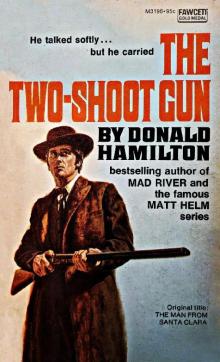 The Two-Shoot Gun
The Two-Shoot Gun Mad River
Mad River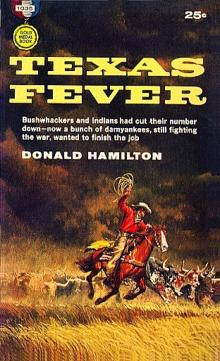 Texas Fever
Texas Fever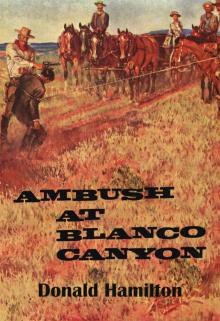 Ambush at Blanco Canyon
Ambush at Blanco Canyon The Big Country
The Big Country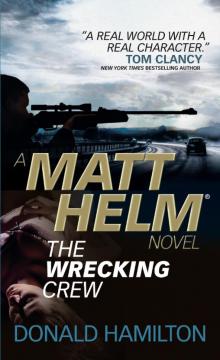 The Wrecking Crew
The Wrecking Crew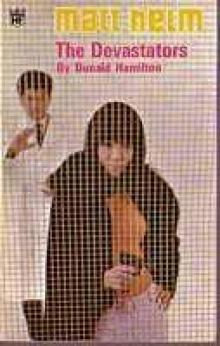 The Devastators mh-9
The Devastators mh-9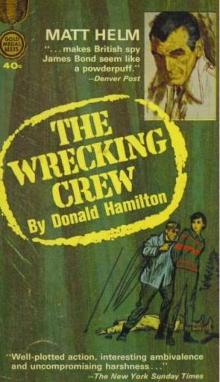 The Wrecking Crew mh-2
The Wrecking Crew mh-2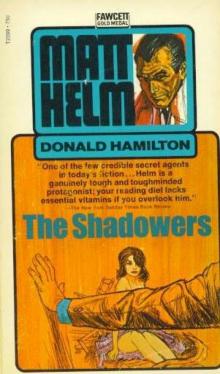 The Shadowers mh-7
The Shadowers mh-7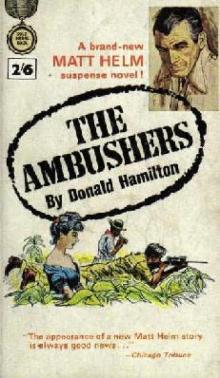 The Ambushers mh-6
The Ambushers mh-6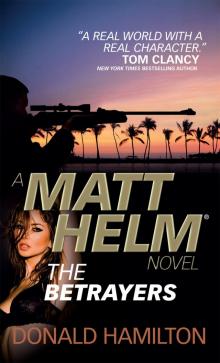 The Betrayers
The Betrayers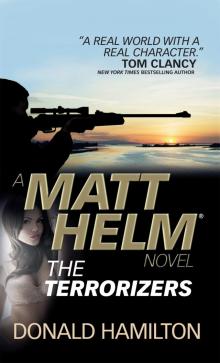 The Terrorizers
The Terrorizers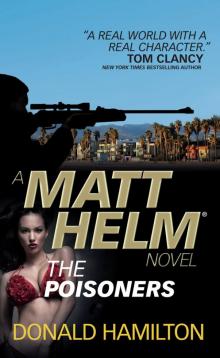 The Poisoners
The Poisoners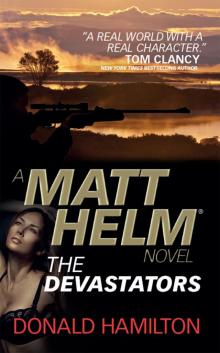 The Devastators
The Devastators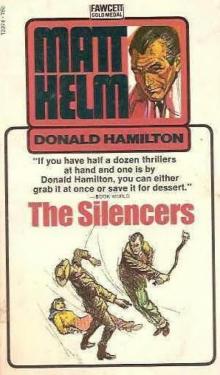 The Silencers mh-5
The Silencers mh-5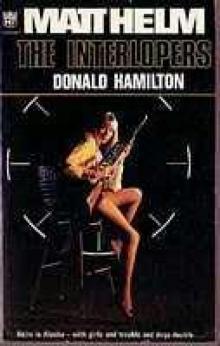 The Interlopers mh-12
The Interlopers mh-12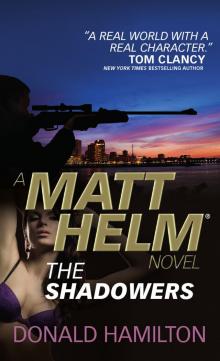 The Shadowers
The Shadowers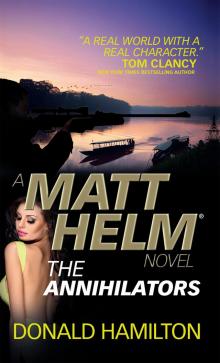 The Annihilators
The Annihilators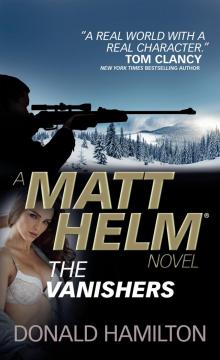 The Vanishers
The Vanishers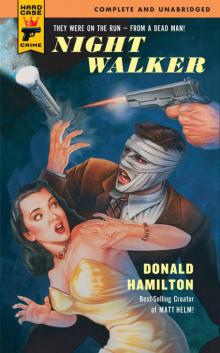 Night Walker
Night Walker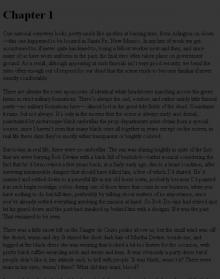 The Revengers
The Revengers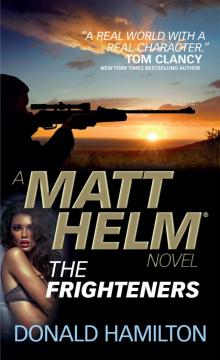 The Frighteners
The Frighteners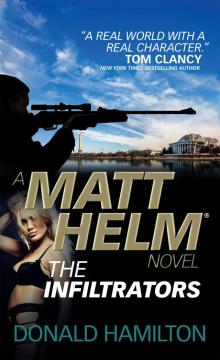 The Infiltrators
The Infiltrators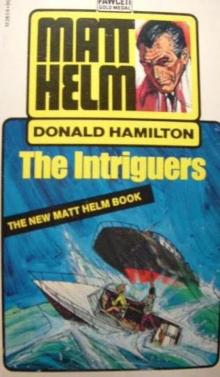 The Intriguers mh-14
The Intriguers mh-14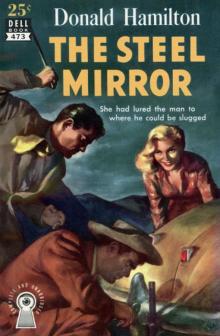 The Steel Mirror
The Steel Mirror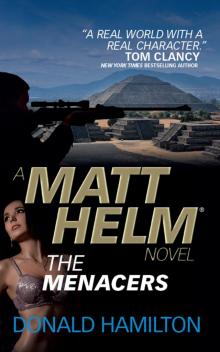 The Menacers
The Menacers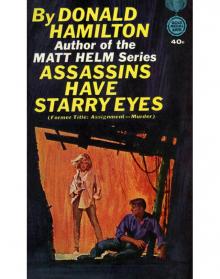 Assassins Have Starry Eyes
Assassins Have Starry Eyes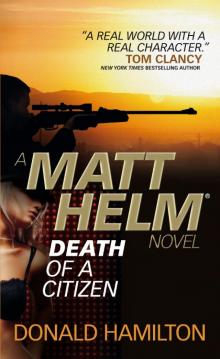 Death of a Citizen
Death of a Citizen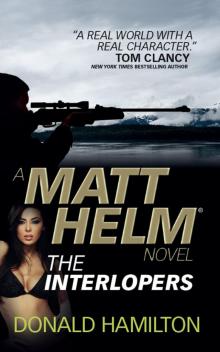 Matt Helm--The Interlopers
Matt Helm--The Interlopers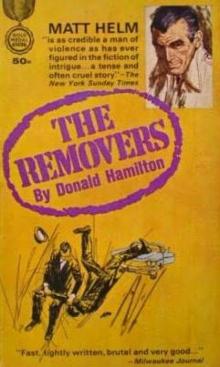 The Removers mh-3
The Removers mh-3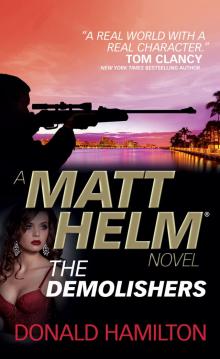 The Demolishers
The Demolishers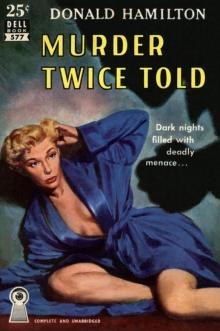 Murder Twice Told
Murder Twice Told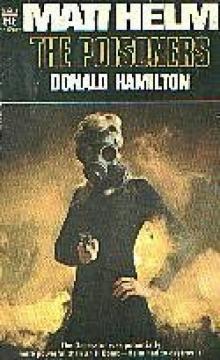 The Poisoners mh-13
The Poisoners mh-13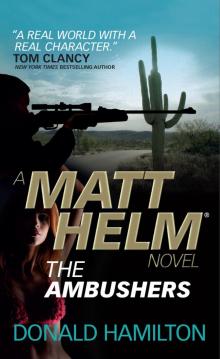 The Ambushers
The Ambushers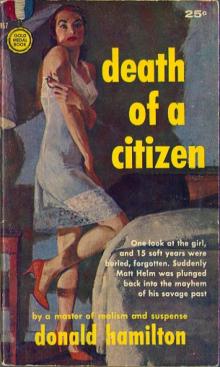 Death of a Citizen mh-1
Death of a Citizen mh-1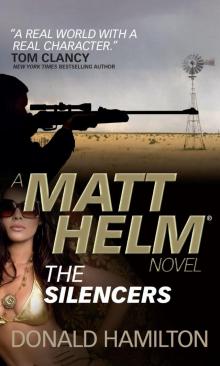 The Silencers
The Silencers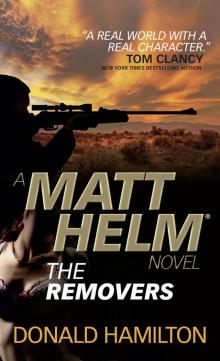 The Removers
The Removers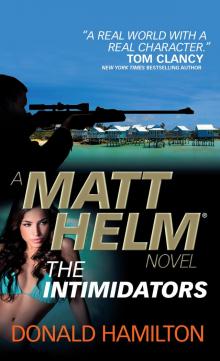 The Intimidators
The Intimidators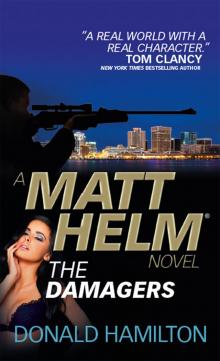 The Damagers
The Damagers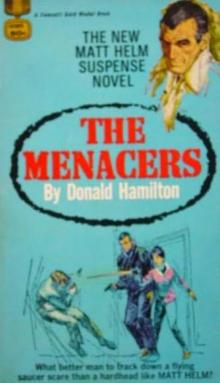 The Menacers mh-11
The Menacers mh-11 The Retaliators
The Retaliators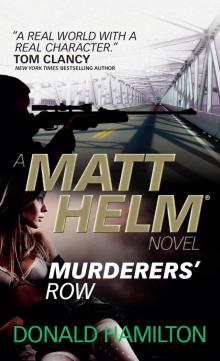 Murderers' Row
Murderers' Row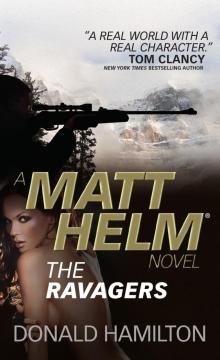 The Ravagers
The Ravagers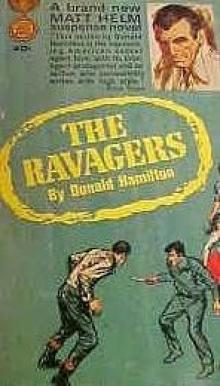 The Ravagers mh-8
The Ravagers mh-8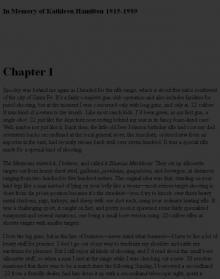 The Threateners
The Threateners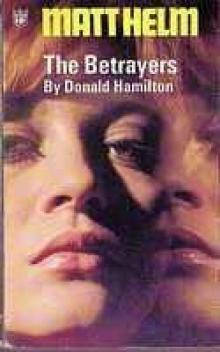 The Betrayers mh-10
The Betrayers mh-10